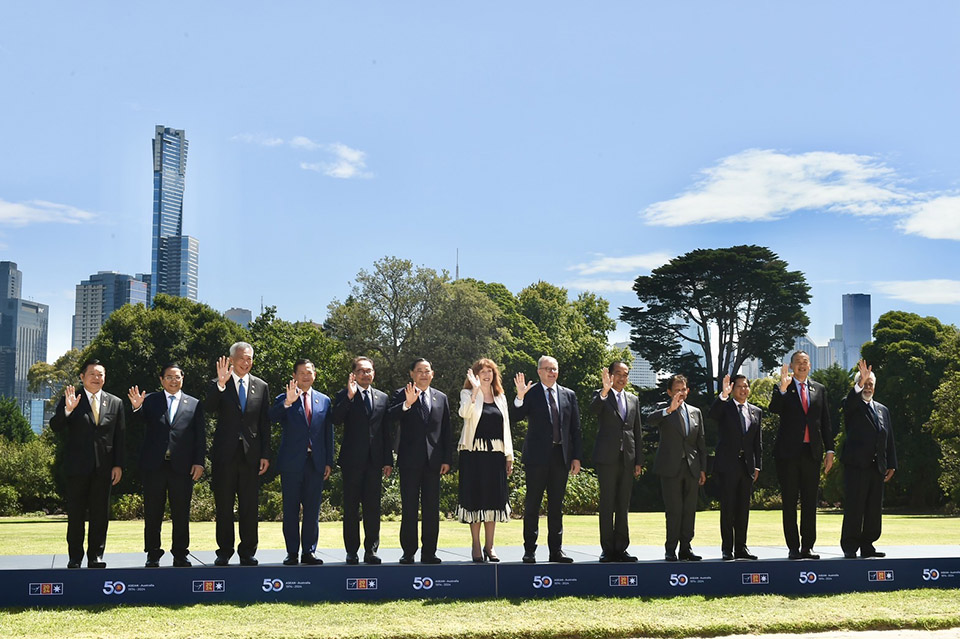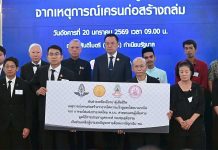
At State Ballroom, Government House Victoria, the Commonwealth of Australia, Prime Minister and Minister of Finance Srettha Thavisin attended the Leaders’ Retreat of the Special Summit to Commemorate the 50th Anniversary of ASEAN-Australia Dialogue Relations, where the Honourable Anthony Albanese MP, Prime Minister of Australia has delivered an opening statement on “Vision for the Region, Strategic Issues and How ASEAN and Australia Can Work Together to Address Shared Challenges”, followed by the interventions of ASEAN leaders. Government Spokesperson Chai Wacharonke disclosed gist of the Prime Minister’s intervention as follows:
The Prime Minister emphasized that the success of cooperation between ASEAN and Australia will depend on the regional security, as well as how common concerns can be addressed, and pointed out a few points on challenges that are seen as critical:
First, amidst competition among major powers, there is a need to foster regional peace and stability. ASEAN and Australia share the same vision of an Indo-Pacific region that is open, rules-based, and inclusive. The Prime Minister added that stable relations among major powers will be key to realizing that vision, and welcomed the renewed efforts between the U.S. and China to improve relations. In addition, there is a need to strengthen regional institutions to promote trust and confidence building. The Prime Minister hoped to count on Australia’s continued support for ASEAN-led mechanisms, and that AUKUS (ออ-คัส) and Quad’s engagements would align with the efforts.
The Indo-Pacific, where two oceans converge, is a region of enormous potential. Its security and prosperity depend on our ability to maintain free and open sea lanes of communication and navigation. Thailand therefore welcomes greater collaboration on maritime security under the ASEAN Outlook.
On the Middle East, Thailand is particularly concerned about the humanitarian crisis in Gaza, and wishes to reiterate its call for the cessation of violence, and for the immediate release of all hostages, including the remaining Thai nationals.
The Prime Minister also touched on the situation in Myanmar, especially on the plight of the people. Thailand has launched an initiative to scale up the delivery of humanitarian assistance, which is a part of ASEAN’s efforts to advance the 5-Point Consensus, in hope that it will lead to a dialogue among stakeholders, and a platform for Myanmar’s engagement with the international community. The Prime Minister expressed hope that Australia will also support this initiative.
Second is the need to foster economic and development partnership. Given the fast-changing geo-economic landscape, there is a need to protect our economies and supply chains by diversifying markets and investments. ASEAN and Australia can also complement each other’s strengths to uplift human security, especially in areas of health and food security.
As a key development partner in the Mekong Sub-region, Australia’s continued support and active engagement is much needed in addressing transnational issues, such as human trafficking and online fraud. This can be done by enhancing capacity building and supporting the networks of security agencies, including through the Bali Process.
Third is the need to foster collaboration to tackle climate change. This is a clear and present challenge, and greater efforts must be put into transitioning away from fossil fuels. Thailand is aiming to become a leading producer of clean energy and a hub for EVs. The country is investing heavily in renewable energy, with the target to increase its share to 50% by 2040. To incentivize the private sector, Thailand has issued green bonds which raised 12.5 billion dollars, and has planned to issue Sustainability-Linked Bonds later this year. In addition, the country is also in the process of drafting the Climate Change Act.
Another pressing challenge is the issue of air pollution, impacting the health security of peoples across borders.
Thailand is in the process of drafting the Clean Air Act, and is developing a Joint Plan of Action called “CLEAR Sky Strategy” with the neighboring countries to address transboundary haze pollution. The country also hopes to work closely with key development partners such as Australia, particularly in the area of relevant innovations.
In closing, the Prime Minister stated that ASEAN-Australia dialogue relations has reinforced strong commitment to advance partnership towards a more peaceful, secure and stable region. He expressed confidence that together ASEAN and Australia will succeed in this shared vision. (PRD)








